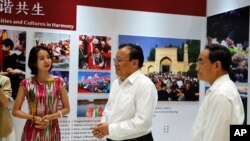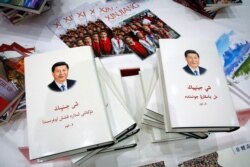Government officials in China's Xinjiang region Tuesday defended the country's self-described "re-education camps" for Muslim minorities, saying the centers serve as a deterrent against religious extremism and terrorism.
Human rights groups have alleged the camps routinely engage in widespread violations. According to estimates by the United Nations, China has detained 1 million people at the camps. Rights groups say a number of them are Uighurs. China has come under international scrutiny over its treatment of Uighurs and other members of largely Muslim minority groups.
China describes the camps as vocational education centers that provide job skills and decrease extremism. Beijing also announced Tuesday that most of those in the re-education centers were no longer in the facilities.
"Most of the graduates from the vocational training centers have been reintegrated into society," Xinjiang Governor Shohrat Zakir said.
"More than 90% of the graduates have found satisfactory jobs with good incomes," he added, having called those detained inside "students."
Another regional official also rejected the characterization of the centers by outsiders.
"Individual countries and news media have ulterior motives, have inverted right and wrong, and slandered and smeared [China]," said Xinjiang vice chairman Alken Tuniaz. He also said a number of people at the camps were being released. "Currently, most people who have received training have already returned to society, returned home."
However, Dilxat Raxit, World Uyghur Congress spokesman, called Zakir a "political microphone" used by China to spread its "deception."
"Shohrat Zakir's remarks completely distort the reality of the systematic persecution that Uighurs are suffering in China," Raxit said.
In early June, 22 U.N. ambassadors signed a letter condemning the camps, urging China to release the Uighurs from detention.
In a related development, Turkish Foreign Minister Mevlut Cavusoglu said Tuesday a delegation will visit Xinjiang to observe the Uighur situation.
Earlier in July, U.S. Secretary of State Mike Pompeo called the internment of China's Muslim minority the "stain of the century," describing their treatment as "one of the worst human rights crises of our time."







